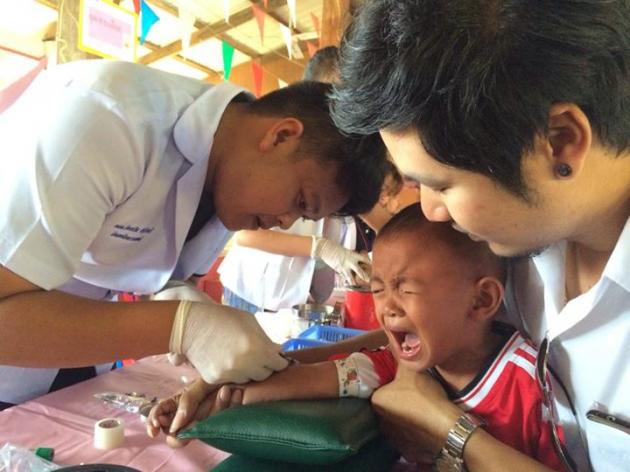EU reps hear about mine, rights woes

Officials learn of villagers' fear of heavy metal contamination
EUROPEAN UNION representatives on Saturday investigated alleged human rights violations in communities near a gold mine in Loei’s Wang Saphung district.
A team from Rangsit University also collected 500 blood and urine samples from residents at Thoongyao Temple in Phitsanulok’s Noen Maprang district, which is near the Chatree Mining Complex, to check for heavy metal levels in their bodies.
Some 20 representatives from eight countries – Poland, Austria, Denmark, Finland, Portugal, Germany, Canada and the Czech Republic – met with villagers who oppose the gold mine operation in Loei. They insisted that they wouldn’t interfere in Thai politics.
The meeting with some 150 members of the Rak Ban Kerd Group was held at Noen Sawang Temple in Banna Nongbong of Tambon Khaoluang. On the scene were almost two dozen soldiers, police and defence volunteers.
During the discussion security personnel and the media waited outside.
Surapan Rujichaiwat a representative of the demonstrators, reportedly told the EU team that villagers had to rise up to protect their natural resources because the gold mine, established a decade ago, had damaged the environment and led to negative social impacts.
He reportedly cited the provincial health office’s warning for people not to use water or consume fish in the area due to heavy metal contamination, which was also observed in villagers’ blood tests.
Surapan said the demonstrators had been threatened and harassed, with the last most violent incident occurring on the night of May 15, 2013 when several demonstrators were attacked and injured by a group of men in a bid to clear the way so ore could be transported out of the mine.
The EU was also told villagers were being sued by the mine operator in many ongoing criminal and civil cases.
EU representative Sandra De Waele said the meeting was initiated so information could be passed on to the government and Thai and foreign human rights organisations.
While in Phitsanulok, Rangsit University professor Smith Tungkasmit said the second blood sample taken on the request of the joint gold-mine problem-solving committee had finished, as all 500 test tubes were used up.
“We have already collected enough samples according to the statistics guidelines and the samples will be tested to find traces of heavy metal, which may come from the goldmine’s activity,” Smith said.
A total 1,000 people in Phichit, Phetchabun and Phitsanulok, who live near Akara Resources’ Chatree Mining Complex, provided the blood samples in two blood and urine collections. The last samples were taken on October 17-18.
Pricha Sangchan, a villager in Noen Maprang district who was also at the blood sample collection site, described the scene as a crowd of people queuing up to provide their blood sample.
Pricha said the anti-gold mine network from 12 provinces distributed bottled water, dried food and rice to the people during the blood sample collection.
He said the people near the goldmine cannot eat or drink anything local anymore because of fear of heavy metal contamination. The group donated food and water to relieve the financial burden of locals who have to buy these supplies from outside.
RELATED
